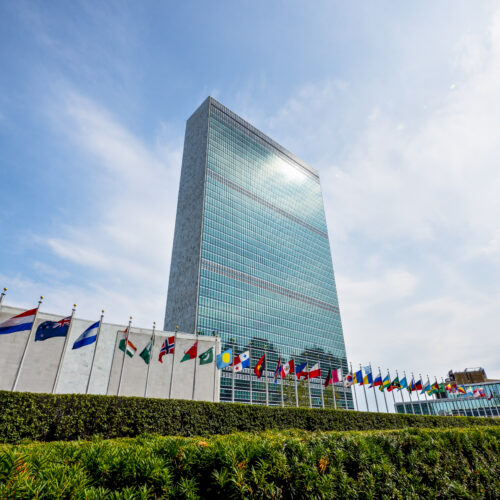The United Nations takes the Ten Principles international

Pleading the Sixth: The United Nations General Assembly adopted new Principles and Guidelines for how member states should deliver indigent defense services. Drafted to help emerging nations grappling with equal justice concerns, the U.N. document can help us hold a mirror up to our own deficient indigent defense systems here at home, as many of the U.N. principles mirror – or exceed – the ABA Ten Principles.
On December 20, 2012, the United Nations General Assembly adopted United Nations Principles and Guidelines on Access to Legal Aid in Criminal Justice Systems – the first international document detailing the “principles on which a legal aid system in criminal justice should be based” to ensure “fundamental fairness and public trust in the criminal justice process.”
The document uses the term “legal aid” but explains that the term includes all “legal advice, assistance and representation for persons detained, arrested or imprisoned, suspected or accused of, or charged with a criminal offence … that is provided at no cost for those without sufficient means or when the interests of justice so require.”
The U.N. General Assembly reminds members states in the preamble that legal aid is “an essential element of a fair, humane and efficient criminal justice system that is based on the rule of law,” and “a foundation for the enjoyment of other rights, including the right to a fair trial, as defined in article 11, paragraph 1, of the Universal Declaration of Human Rights.”
The United Nations Principles & Guidelines
Of particular note is how closely the new U.N. Principles align with the American Bar Association’s Ten Principles of a Public Defense Delivery System. For example, ABA Principle 1 requires that, no matter what delivery services model is employed in a jurisdiction (staffed public defender, non-profit defender contract defender, assigned counsel, or contract private defender), the system be independent from political or judicial interference. Similarly, U.N. Principle 12 calls upon member nations to, “ensure that legal aid providers are able to carry out their work effectively, freely and independently,” noting specifically that states “should ensure that legal aid providers are able to perform all of their professional functions without intimidation, hindrance, harassment or improper interference; are able to travel, to consult and meet with their clients freely and in full confidentiality both within their own country and abroad, and to freely access prosecution and other relevant files; and do not suffer, and are not threatened with, prosecution or administrative, economic or other sanctions for any action taken in accordance with recognized professional duties, standards and ethics.”
Of particular interest to the U.N. General Assembly is the point at which public defense lawyers enter a case to be able to meet with clients, begin investigations, and zealously advocate on their behalf. The ABA Ten Principles suggests that defendants should be “screened for eligibility, and defense counsel is assigned and notified of appointment, as soon as feasible after clients’ arrest, detention, or request for counsel.” (Principle 3, emphasis added.) And, of course, despite the United States Supreme Court decision in Rothgery v. Gillespie County requiring the Sixth Amendment right to counsel to attach at a “criminal defendant’s initial appearance before a magistrate judge, where he learns the charge against him” (e.g. an arraignment) and “his liberty is subject to restriction,” (e.g. a bail hearing), only a handful a state systems (Connecticut and Massachusetts) regularly provide counsel so early on in the life of a case. (Read about Maryland’s move to provide counsel at bail review hearings, here.)
But for the U.N., a defendant that first meets with counsel at an arraignment or bail hearings has already had his right to counsel infringed upon. Under Guideline 41, preliminary public defense representation should be provided at “police stations” and “detention centers” even “while their eligibility is being determined.” In these situations, children should be presumed indigent and be “always exempted from the means test.” Under Guideline 43, the right to counsel should be guaranteed at any stage of the criminal proceedings, “especially before being interviewed by the authorities.” The same Guideline requires that, at the very least, police stations and places of detention provide “the means to contact legal aid providers” before formal questioning begins.
Other of the ABA Ten Principles are also echoed throughout the U.N. document. For example, ABA Principle 6 states that “[d]efense counsel’s ability, training, and experience match the complexity of the case.” U.N. Principle 13 similarly calls for states to “put in place mechanisms to ensure that all legal aid providers possess education, training, skills and experience that are commensurate with the nature of their work, including the gravity of the offences dealt with.” ABA Principle 4 requires that “[d]efense counsel is provided sufficient time and a confidential space within which to meet with the client,” while the U.N. document demands that “effective” legal aid must include, amongst others, “unhindered access to legal aid providers for detained persons, confidentiality of communications, access to case files and adequate time and facilities to prepare their defence.”
As with the ABA Ten Principles, the U.N. Principles and Guidelines recognize that different jurisdictions “employ different models” for the provision of the indigent defense to adults and juveniles, including, “public defenders, private lawyers, contract lawyers, pro bono schemes, bar associations, paralegals and others,” but states affirmatively that the principles and guidelines contained therein are to be met regardless of delivery model.
The Importance of the U.N. Document
Though the U.N. document is technically non-binding on member states, such documents are used to set the international norm for criminal procedures, and their importance carries even more weight than the ABA Ten Principles. The final adoption process followed a similar one used for the adoption of the Universal Declaration of Human Rights. The Universal Declaration has a special place in international law even though it is technically not binding either. Still many international courts rely on the Declaration and, over the years, it has been cited in many cases domestically.
The importance of the new U.N. document is, perhaps, best explained in a document produced by the American University Washington College of Law’s Local Human Rights Lawyering Project (LHRLP), run out of its Center for Human Rights & Humanitarian Law, which indicates that the new document is similar to a “Restatement of the Law” in American jurisprudence. That is, it is reflective of a growing consensus in the international community of the importance of, in this case, the right to counsel, and that its adoption may be an indication that this right will continue to be developed and further recognized under international law.
As the LHRLP document explains, there are a number of ways that the U.N. Principles and Guidelines can be used domestically. First, the “U.S. Supreme Court has recognized that the laws of the U.S. should be interpreted as consistent with international law whenever possible.” (Citing Murray v. Schooner Charming Betsyand Talbot v. Seeman.) In addition, the LHRLP document argues convincingly that “where there is no controlling U.S. law, state courts should look to customary international law for guidance for its decision.” An example of this occurred in 2005, when the U.S. Supreme Court in Roper v. Simmons determined the imposition of a death sentence on a juvenile under the age of eighteen to be unconstitutional. Justice Kennedy, writing for the majority, observed that “[i]t does not lessen our fidelity to the Constitution or our pride in its origins to acknowledge that the express affirmation of certain fundamental rights by other nations and peoples simply underscores the centrality of those same rights within our own heritage of freedom.”
Conclusion
The U.N. document points the way for another approach to remedying the long-standing indigent defense deficiencies plaguing many of our state criminal justice systems. Guideline 15 on the regulation and oversight of legal aid providers calls for all indigent defense systems to be “accredited.” Long championed by one of the giants of the provision of indigent defense technical assistance, Marshall Hartman, accreditation would have indigent defense systems be evaluated against national standards just as hospitals or law schools are today.
There is already some precedent for this as the U.S. Congress required the accreditation of crime laboratories in the Innocence Protection Act of 2004. Congress could authorize an independent non-profit group versed in systemic standards to accredit public defense systems. Technical assistance could be provided to those jurisdictions that fail to be accredited, putting a greater pressure on local, county or state indigent defense systems to meet the ABA Ten Principles.


